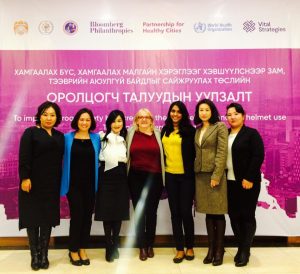The capital of Mongolia and two of Colombia’s biggest cities announced their Partnership for Healthy Cities initiatives last week, publicizing their commitments to improving the health of their cities over the coming months under the Bloomberg Philanthropies project, which Vital Strategies is helping to implement.
Ulaanbaatar’s plan to encourage seat belt use was the topic of a Partnership workshop in the rapidly urbanizing city on Tuesday, November 7th. Road crashes are alarmingly common in Ulaanbaatar, and while there are seat belt laws, too few residents are in the habit of buckling up.

Sylviane Ratte, Deputy Director of Vital Strategies’ Road Safety Program (fourth from left), and Ramya Kancharla, Program Officer, Partnership for Healthy Cities (third from right), at the Partnership workshop and launch in Ulaanbaatar.
Vital Strategies staff, Ulaanbaatar city officials and local experts pinned down the final details of the city’s Partnership initiative, which will combine media campaigns that persuade people to use seat belts with stronger enforcement of the law. Deputy Mayor Sh. Ankhmaa and Dr. L. Tumurbaatar, Director of the city’s Health Department, were among those participating.
On Thursday, November 9th, two of Colombia’s biggest cities were next to announce: Both Cali and Medellín are pursuing strategies to improve the diets of schoolchildren by getting schools to reduce the availability of junk food—amid alarming obesity rates.

María Fernanda Cárdenas, Vital Strategies Communications Manager in Colombia, is interviewed by the media at the Partnership for Healthy Cities announcement in Medellín, Colombia.
“In Cali, 30 percent of school age children are obese,” the city’s Health Department Director, Alexander Durán, told reporters at the announcement, which took place at a local elementary school, where about 100 children in school uniforms joined city officials. “These are important factors that predispose this future generation to illnesses such as cancer and other diseases such as hypertension,” he said.
Medellín’s Health Department Director Claudia Helena Arenas announced her city’s plan at a “Congress on Healthy Lifestyles.”
Vital Strategies’ Maria Fernanda Cárdenas, Communications Manager for Colombia, also spoke at the press conference. She discussed efforts nationwide to combat obesity and noted that the country’s three biggest cities—not just Cali and Medellín but Bogotá as well—are all choosing to focus on policies to enable healthier food in schools and might well serve as models for other Colombian cities.
Bogotá announces its Partnership initiative next week.
The Partnership for Healthy Cities, led by Michael Bloomberg, the World Health Organization (WHO) Global Ambassador for Noncommunicable Diseases (NCDs) and former New York City Mayor, is a global network of more than 50 cities selecting among ten proven public health interventions to fights NCDs and injuries.